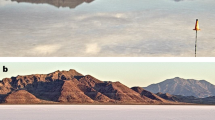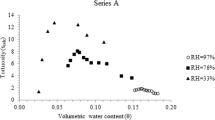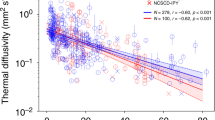Abstract
SEVERAL workers (for example Gurr et al.1, Hutcheon2) have suggested that, when a temperature gradient is applied to a uniform closed soil column, a circulatory system is set up, and that any eventual steady moisture distribution is actually a dynamic balance of opposing fluxes, predominantly vapour from hot to cold, and predominantly liquid from cold to hot. In this communication we show that, at equilibrium, a static system cannot exist, and confirm experimentally the existence of a circulatory system.
This is a preview of subscription content, access via your institution
Access options
Subscribe to this journal
Receive 51 print issues and online access
$199.00 per year
only $3.90 per issue
Buy this article
- Purchase on Springer Link
- Instant access to full article PDF
Prices may be subject to local taxes which are calculated during checkout
Similar content being viewed by others
References
Gurr, C. G., Marshall, T. J., and Hutton, J. T., Soil Sci., 74, 335 (1952).
Hutcheon, W. L., Highway Res. Board, SR 40, 113 (1958).
Author information
Authors and Affiliations
Rights and permissions
About this article
Cite this article
JACKSON, R., ROSE, D. & PENMAN, H. Circulation of Water in Soil under a Temperature Gradient. Nature 205, 314–316 (1965). https://doi.org/10.1038/205314b0
Issue Date:
DOI: https://doi.org/10.1038/205314b0
This article is cited by
-
The Role of Water in Unbound Granular Pavement Layers: a Review
Transportation Infrastructure Geotechnology (2019)
-
The effect of container porosity on root environment and plant growth
Plant and Soil (1971)
Comments
By submitting a comment you agree to abide by our Terms and Community Guidelines. If you find something abusive or that does not comply with our terms or guidelines please flag it as inappropriate.



